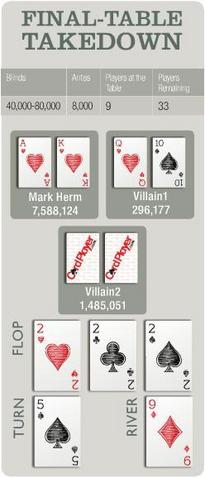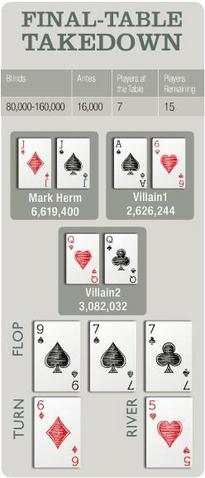Final Table Takedown With Mark HermHerm Walks Us Through Two Key Hands In Sunday Million Win |
|
|
This strategy column, and many like it, are featured in every issue of Card Player magazine. Subscribe today to get 26 issues delivered to your home each year!

This past May, Herm had dual runner-up performances, in the Full Tilt Poker Sunday Brawl and the PokerStars Sunday 500, for $77,000 and $71,600, respectively. Herm has amassed more than $3.4 million in career online tournament cashes.
In this interview, Herm walks us through his recent in the PokerStars Sunday Million.
| Event | PokerStars Sunday Million |
| Players | 7,661 |
| Buy-In | $215 |
| First Prize | $229,833 |
| Finish | First |

Key Concept: Applying pressure to weak opponents during deep stack play; bluff-raising river against obvious weakness
Craig Tapscott: You’ve made it through more than 7,600 players up to this point. What are the key things you think about as you approach the final table.
Mark Herm: I try to spot the players who are playing weak or scared poker deep in these huge events. A lot of the players, obviously, aren’t professionals, so to most of them, the money at stake is life-changing. As a result, people really clam up and get taken off their games, because they are so afraid of busting out. That’s why it’s so important to play very aggressively in a lot of spots, because people will just fold.
Conversely, there are always people out there who either don’t care that much about the money at stake or are just too oblivious to think about folding in certain spots. These are the people I’m really trying to stay away from, as they can put me in a lot of high-variance spots, when the last thing I’m trying to do deep in a major event is gamble. I actually bluffed off a ton of chips in this event to some guy I didn’t have much info on. I didn’t realize that he was as loose or as bad as he was, because I hadn’t been playing with him much up to that point. Poker is game of partial information, and oftentimes when you try to bluff a person you don’t know well, it ends up not working out.
CT: What’s the biggest mistake that inexperienced players make when they get close to a big payday?
MH: Overall, people play far too tight a just try to fold to the final table. Usually, that’s not the best option if we’re talking about playing the most profitable long-term poker.
Villian1 moves all in for 288,177 from under the gun. Herm calls with A K
K from middle position.
from middle position.
CT: Why would you not isolate this player by reraising when holding such a big hand as A-K?
MH: Yeah. This hand is really wierd. I opted to flat-call the small shove rather than reraise because I was hoping someone behind would like to isolate. I don’t think it’s that important that I decided to flat here. I think reraising is perfectly fine, and to be honest, most times I would reraise, but for whatever reason here, I wanted to get tricky.
Villian2 calls from the big blind.
Flop: 2 2
2 2
2 (pot: 976,531)
(pot: 976,531)
Villian2 checks. Herm checks.
Turn: 5 (pot: 976,531)
(pot: 976,531)
Villian2 bets 240,000. Herm calls.
CT: Do you have any clue what he’s betting out with here?
MH: When he bets here, it’s kind of confusing. He shouldn’t be betting with nothing, because he would have to beat the all-in player. But my observation up to this point was that he was playing pretty terribly. So, I thought that he could be doing something really dumb, like trying to bluff, and I most likely had two overcards if my hand was not good at the moment.
River: 9 (pot: 1,456,531)
(pot: 1,456,531)
Villian2 bets 80,000.
CT: That’s a weird bet.
MH: Yeah. When he min-bets, it looks like he has something like a small pair to go along with the trips on the board. He probably puts me on exactly what I have, and wants me to just call this bet. So, all of this being said, I shove, because I don’t think he will call.
CT: Why not?
MH: Because my hand actually looks pretty strong, and he will get to see my hand either way, because of the all-in player.
Herm moves all in. Villian2 folds. Villian1 reveals Q 10
10 and Herm wins the pot of 1,536,531.
and Herm wins the pot of 1,536,531.

Key Concept: Paying attention to a player’s bet timing; knowing when you’re beat
Herm raises too 323,900 with the J J
J .
.
MH: This is just a preflop spot that I found pretty interesting while approaching the final table. I had been opening almost every hand, so pocket jacks are obviously a huge hand in this spot.
Villian1 shoves all in from the small blind. Villian2 moves all in from the big blind.
CT: How fast did Villian2 reshove here?
MH: He immediately jammed all in.
CT: What was your read on Villian2?
MH: He had been playing very timidly. I really don’t think he’d ever have pocket tens, so I figured it was a fairly easy fold for pocket jacks. In spots like this deep in these tourneys, I play crazily, but when it comes down to getting in big preflop pots that go to showdown, I really try to stay cautious, because I feel that these are the spots that can be avoided as you approach the final table. As we get closer and closer, I’m really trying to win as many pots as possible without a showdown, and slowly accumulate chips that way.
Herm folds. Villian1 reveals A 6
6 . Villian2 flips over Q
. Villian2 flips over Q Q
Q .
.
Flop: 9 7
7 7
7 (pot: 5,656,388)
(pot: 5,656,388)
Turn: 6 (pot: 5,656,388)
(pot: 5,656,388)
River: 5 (pot: 5,656,388)
(pot: 5,656,388)
Villian2 wins.
CT: Without giving away too many secrets, what kinds of situations are you looking to take advantage of on the final-table bubble?
MH: At that point, I probably have been playing with the players at my table for a decent amount of time, enough that I can probably spot the players who are trying to just fold to the final table and those who are really trying to make a run at first place and accumulate chips. Obviously, with these reads, I will play accordingly and try to prey on the weaker players. I’m also keeping in mind the players who will be playing back at me, and am adjusting to that.
CT: Is there anything else that I can pry out of you?
MH: sure. I think it helps a lot to just have experience in playing for this kind of money. You can’t let your emotions get the best of you. It’s just like anything else — the more times you practice something, the better you get at it. Overall, I think a weakness that a lot of good players have is not paying enough attention to their opponents.
I feel as though I completely change the way that I play depending on the players at my table. Paying very close attention to your opponents, especially when deep in these big events, is just so valuable, and it’s free information. So, it would be silly not to use what info you can gather. Understanding that poker is truly a people game will vastly improve a lot of players games.
